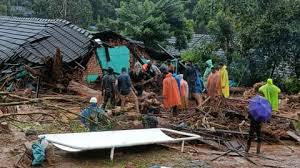Unnatural disaster: On the Wayanad landslides
Kerala must restore denuded flora and rehabilitate people in vulnerable areas
Climate change can encourage unprecedented weather, precipitating natural disasters of magnitudes that may surprise local responders. The calamitous landslides in Wayanad district in Kerala on July 30 are not necessarily such disasters. Parts of Kerala have been bearing the brunt of heavy rains during the southwest monsoon and landslides are a yearly affair. But deadly landslides are new. This week, heavy rains triggered multiple landslides that have killed 200 people and laid waste to a few villages. The region is a tourist destination and incentivises infrastructure development to maximise revenue potential. The Chaliyar river here springs from an altitude of around 2 km and flows in a sheer path down towards Vellarmala, bringing fast waters that also sweep relatively more sediment downstream. The rains this year further increased the river’s volume and force, which swept up debris and deposited it in the villages settled on less steep land where many of the deaths have been reported. But the tragedy is compounded by the fact that heavy rains here in 2020 had caused the Chaliyar to strip swaths of its upstream areas of plant cover, leaving more rocks and humus vulnerable to being displaced.
The geographical peculiarities of landslide-prone Idukki, Kottayam, Malappuram, and Wayanad have been evident for years; they also feature prominently on landslide risk maps. Blame for the landslides’ deadly recurrence must thus be shared by climate change and a State that has been repeatedly caught off-guard. A recurring issue is an abject lack of advance warning and emergency preparedness. Landslides are more common in ecologically fragile areas. The monsoons have been producing more short bursts of intense rain, resulting in some soil types becoming easier to dislodge while quarrying; linear infrastructure development, construction activities, and monocropping have compromised ecosystems’ ability to cope with changing natural conditions. For these reasons, patterns of land use must not change and the State must restore denuded flora and rehabilitate people in these areas to ensure they have other opportunities for their welfare. As recommended by the Western Ghats Ecology Expert Panel, Kerala must also decline engineering projects in ecologically sensitive areas and their surroundings, and constitute, equip, staff, and empower expert committees that deliberate the feasibility of other projects here. Indeed, the panel’s recommendations were designed to tame the effects of unpredictable weather without also denting economic growth, but Kerala today is sliding past the point of having an option to balance development needs with environmental concerns.
